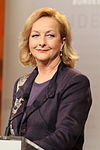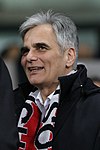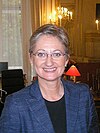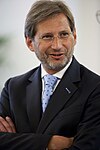Federal Government Gusenbauer
| Federal Government Gusenbauer | |
|---|---|
| 26. Federal Government of the Second Republic of Austria | |

|
|
| Chancellor | Alfred Gusenbauer |
| choice | 2006 |
| Legislative period | XXIII. |
| Appointed by | Federal President Heinz Fischer |
| education | January 11, 2007 |
| The End | December 2, 2008 |
| Duration | 1 year and 326 days |
| predecessor | Federal Government Bowl II |
| successor | Federal government Faymann I |
| composition | |
| Party (s) | SPÖ and ÖVP |
| representation | |
| National Council | 134/183 |
The Austrian federal government Gusenbauer was sworn in on January 11, 2007 by Federal President Heinz Fischer . After seven years it formed a grand coalition of SPÖ / ÖVP and succeeded the Schüssel II government (ÖVP / BZÖ). She was in office until December 2, 2008. The inauguration was preceded by several months of negotiations between the government partners, the Social Democrats and the conservative People's Party .
Government formation
From the National Council election on October 1, 2006 , the SPÖ emerged as the party with the largest number of seats (68 seats), closely followed by the People's Party (66 seats), which had lost its previous relative majority. In addition to the Greens (21 mandates) and the FPÖ (21 mandates), the BZÖ (7 mandates) also moved into the National Council for the first time .
On October 11, 2006, Federal President Fischer entrusted the SPÖ's top candidate, Alfred Gusenbauer , with the formation of a federal government based on a stable majority in parliament. In addition to the grand coalition , this majority was arithmetically possible through a three-party coalition made up of a large party and two smaller parties. Realpolitically, this possibility was ruled out from the start due to insurmountable political differences between the three smaller parties. The coalition negotiations that had begun were interrupted by the ÖVP at the beginning of November after the new National Council set up committees of inquiry on October 30, against the will of the ÖVP, on the issues of purchasing Eurofighters and banking supervision . The negotiations were resumed on November 16, and after months of negotiations, the SPÖ and ÖVP agreed on January 8, 2007 to form a grand coalition, after Federal President Fischer announced January 11 as the day of the inauguration of a new coalition before the end of the negotiations Government stated.
The result of the negotiations was perceived as unfavorable allocation of responsibilities and retention of parts of the SPO mainly due to the tuition heavily criticized. In connection with the formation of the government, the press conference of the Styrian Governor Franz Voves on January 10th, at which he strongly criticized party chairman Gusenbauer and decided in front of the camera about the deployment of Heidrun Silhavy as State Secretary, also caused a stir in the media .
The Gusenbauer government was able to rely on more than two-thirds of the mandates from the National Council and was therefore not dependent on the parliamentary opposition to pass constitutional bills .
composition
The federal government under Alfred Gusenbauer was sworn in on January 11, 2007 by Federal President Heinz Fischer. The federal law regulating the division of departments was passed by the National Council on January 30, 2007.
resolution
On July 7th, 2008 ÖVP boss and vice chancellor Wilhelm Molterer announced the decision to end the cooperation with the SPÖ because it was “disoriented and leaderless” with the statement “It is enough”. This was preceded by their shift in EU policy and the failure of the negotiations on health reform. There was an early National Council election on September 28, 2008 .
The subsequent federal government, Faymann I , which was announced on November 23, 2008 and sworn in on December 2, 2008, is again a grand coalition. It came about mainly through the negotiations of the ministers Werner Faymann and Josef Pröll, who were already responsible for coalition issues in the Gusenbauer government.
Individual evidence
- ^ Government formation order of the Federal President of October 11, 2006 ( Memento of September 28, 2007 in the Internet Archive )
- ^ Kurier: ÖVP ends coalition ( Memento from July 5, 2008 in the Internet Archive )

















